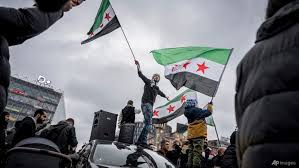For centuries, Syria represented a tapestry of coexistence, where Sunnis, Shias, Christians, Alawites, and Druze lived alongside one another, weaving their diverse traditions into the fabric of society. However, the events of the last decade have unraveled this pluralism, leaving a fractured nation consumed by violence, extremism, and geopolitical rivalries.
Analysts argue that Syria’s collapse is less an accidental tragedy and more a calculated outcome of geopolitical maneuvering that prioritizes dominance over stability, hegemony over humanity. What was once a vibrant, secular society has become a battleground for competing ideologies, exploited sectarian divides, and external powers seeking to reshape the region for their benefit.
A Watershed Moment in Syria’s History
The fall of President Bashar al-Assad’s regime in 2024 marks a significant turning point in Syria’s history. While it stunned the world, analyst Scott Ritter contends that it was not the result of a carefully orchestrated plan but rather a rapid series of reactive decisions capitalizing on Syria’s internal decay. According to Ritter, this chaos reveals the opportunism of foreign powers and the fragility of Assad’s foundations—a house of cards that could not withstand the combined weight of internal corruption and external pressures.
Geir Pedersen, the United Nations Special Envoy for Syria, echoed this sentiment, describing the rapid collapse of Damascus as both a watershed moment and an unforeseen event. Pedersen admitted that even the armed groups now in control of Damascus were caught off guard by the speed of the regime’s downfall. Within two weeks, the Assad regime’s military disintegrated, leaving Damascus under the control of Hay’at Tahrir al-Sham (HTS) and other opposition factions.
The “Devil’s Bargain” and the Decline of Pluralism
At the heart of Syria’s disintegration lies what former British ambassador Craig Murray calls a “devil’s bargain.” This alleged agreement among Turkey, Gulf States, NATO, and Israel aimed at strategically reshaping the Middle East to suppress Palestinian resistance and impose a Salafist ideology on the region. In this bargain, Syria’s Shia communities and religious minorities became collateral damage.
The impacts are stark. In Aleppo, reports describe a grim transformation: Christmas decorations smashed, alcohol banned, and women forced to adopt Salafi veils. For Christians and other minorities, these measures symbolize not just cultural suppression but an existential threat. Once a vibrant hub of diversity, Aleppo has become emblematic of the destruction of Syria’s pluralistic heritage.
“This marks the end of Syria and Lebanon’s pluralistic traditions,” Murray warns. He adds that these changes could pave the way for a Salafist state akin to the Taliban’s reign in Afghanistan, erasing centuries of coexistence and shared history.
The rise of figures like Abu Mohammad al-Jolani, a former ISIS deputy now leading HTS, exemplifies the calculated manipulation of extremist factions. Jolani, once considered a terrorist with a $10 million CIA bounty, has astonishingly transitioned into a “legitimate” leader, a transformation facilitated by Western media and intelligence agencies. CNN’s favorable coverage of Jolani, reportedly coordinated with the CIA, illustrates how narratives are sanitized to serve geopolitical agendas.
United Nations’ Call for De-escalation
The United Nations has raised concerns over the fragility of the situation in Syria. While HTS is the dominant force in Damascus, Pedersen warned that the armed groups controlling various territories operate as a patchwork of factions, with no unified leadership. He stressed the importance of preventing internal conflicts between these groups, urging all parties to uphold law and order and adhere to international humanitarian law.
Pedersen also highlighted the ongoing violence in the northeast, where clashes between the Turkish-backed Syrian National Army and the Syrian Democratic Forces (SDF) continue. The UN has called for calm and emphasized the need to protect civilians and preserve public institutions.
Israeli Military Operations and Regional Destabilization
Following the collapse of Assad’s regime, Israel has intensified its military operations in Syria, targeting a wide range of sites with unprecedented intensity. These actions, the Israeli government asserts, are necessary to prevent advanced weaponry from falling into the hands of hostile groups, such as Hezbollah and other Iranian-backed militias, amid the power vacuum created by Assad’s fall.
Key Incidents:
November 14, 2024: Israeli airstrikes targeted residential buildings in Damascus, specifically in the Mazzeh and Qudsaya neighborhoods. These strikes resulted in at least 15 fatalities and 16 injuries. The Israel Defense Forces (IDF) claimed the operation targeted infrastructure and command centers linked to the Islamic Jihad militant group. (AP News)
November 20, 2024: Airstrikes in Palmyra, central Syria, struck residential areas and an industrial zone, causing widespread destruction. While Syrian state media reported 36 deaths and 50 injuries, the Syrian Observatory for Human Rights suggested a higher death toll, including numerous Iranian-backed militiamen. (Al Jazeera)
Post-Assad Collapse: Over the past month, Israel has conducted approximately 250 airstrikes across Syria, focusing on military positions and suspected weapon storage sites, including areas around Damascus and the port of Latakia. (Cadena SER)
The UN has condemned these operations, with Pedersen calling for an immediate cessation of hostilities. He warned that Israeli actions could derail any progress toward stability and violate international law, particularly the 1974 disengagement agreement governing the Golan Heights buffer zone.
Foreign Powers and Proxy Warfare
Syria’s crisis cannot be understood without examining the role of foreign actors. Turkey, a NATO member, has played a pivotal role in facilitating the flow of foreign fighters into Syria. Turkish-backed forces, composed largely of non-Syrian mercenaries, have seized control of northern territories, replacing Syrian governance with Turkish currency and administrative systems.
Simultaneously, the United States and Israel have pursued targeted strikes to undermine the Syrian government and its allies. Israeli airstrikes, often aimed at disrupting Hezbollah and Iranian supply lines, have further destabilized the region. The United States, meanwhile, has supported extremist factions, including HTS, with airpower—a move Ritter argues reveals the hypocrisy of Western anti-terrorism narratives.
Neighboring countries, including Turkey, Egypt, and Saudi Arabia, have condemned Israel’s operations as violations of international law. These nations have urged the international community to intervene, warning that unchecked hostilities risk plunging the Middle East into deeper chaos.
Humanitarian Devastation and the Path Forward
The human toll of Syria’s collapse is staggering. Over 13 million Syrians have been displaced, with countless lives lost to war and deprivation. Cities such as Aleppo, Raqqa, and Homs lie in ruins, their infrastructures obliterated. Syria’s minorities, including Christians, Druze, Kurds, and Alawites, face existential threats, while Sunni Muslims, displaced and disenfranchised, have become pawns in a geopolitical chess game.
Pedersen shared stories of displaced Syrians expressing hope for the future. Many are eager to return home but face monumental challenges, including Syria’s economic collapse and the dire state of its infrastructure. The UN has called for lifting sanctions, increasing humanitarian aid, and launching economic recovery programs to support Syria’s rebuilding efforts.
A Cautionary Tale and a Call for Unity
Syria’s fall is more than a national tragedy—it signifies a seismic shift in Middle Eastern geopolitics. Analysts fear the collapse of Syrian pluralism may spill over into neighboring countries like Lebanon, where sectarian tensions are already high. A Salafist-controlled Syria could destabilize Beirut, empowering jihadist forces and threatening regional stability.
The UN stresses the importance of uniting Syria’s diverse factions under an inclusive transitional framework. Pedersen emphasized that preserving state institutions and ensuring the representation of all communities are essential steps toward stability. Without a united international effort, Syria risks remaining a fractured shadow of its former self—a stark reminder of the human cost of unchecked geopolitical ambition.
—
Abu Mohammad Al-Jolani, sometimes spelt Al-Julani or Al-Golani, who is now being boosted throughout western media as a moderate leader. He was the deputy leader of ISIS, and the CIA actually has a $10 million bounty on his head! Yes, that is the same CIA which is funding and equipping him and giving him air support.
Supporters of the Syrian rebels still attempt to deny that they have Israeli and US support – despite the fact that almost a decade ago there was open Congressional testimony in the USA that, to that point, over half a billion dollars had been spent on assistance to Syrian rebel forces, and the Israelis have openly been providing medical and other services to the jihadists and effective air support.
One interesting consequence of this joint NATO/Israel support for the jihadist groups in Syria is a further perversion of domestic rule of law. To take the UK as an example, under Section 12 of the Terrorism Act it is illegal to state an opinion that supports, or may lead somebody else to support, a proscribed organisation.
The abuse of this provision by British police to persecute Palestinian supporters for allegedly encouraging support for proscribed organisations Hamas and Hezbollah is notorious, with even tangential alleged references leading to arrest. Sarah Wilkinson, Richard Medhurst, Asa Winstanley, Richard Barnard and myself are all notable victims, and the persecution has been greatly intensified by Keir Starmer.
Yet Hay’at Tahrir Al-Sham (HTS) is also a proscribed group in the UK. But both British mainstream media and British Muslim outlets have been openly promoting and praising HTS for a week – frankly much more openly than I have ever witnessed anyone in the UK support Hamas and Hezbollah – and not a single person has been arrested or even warned by UK police.
That in itself is the strongest of indications that western security services are fully behind the current attack on Syria.
—-
The unspoken but very real bargain is this. The Sunni powers will accept the wiping out of the entire Palestinian nation and formation of Greater Israel, in return for the annihilation of the Shia communities in Syria and Lebanon by Israel and forces backed by NATO (including Turkey).
Craig Murray
Beirut. 6 December, 2024




